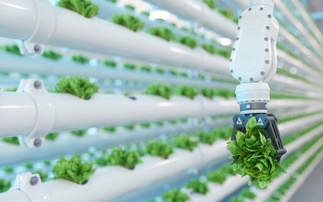EXCLUSIVE: Competition law is having a 'chilling effect' on sustainability projects in the agriculture supply chain, Fairtrade Foundation warns
Fear of breaching competition law is discouraging companies in the UK grocery sector from working together to tackle low pay and extreme poverty among farmers, according to new research from the Fairtrade Foundation.
The study, seen exclusively by BusinessGreen, warns ending low wages in the food supply chain is crucial for tackling a host of inter-related sustainability challenges, including improving the sector's climate resilience and tackling deforestation.
But the report warns that without clearer guidance from the Competition and Markets Authority (CMA) setting out how firms can work together to raise 'farm-gate prices' - the price paid to farmers for their product - action will remain stymied.
"Our findings suggest that businesses must be able to work together to address low incomes in the supply chain," the report reads, citing both the need for co-ordinated action from multiple firms to drive whole-system change, and the intense market competition that prevents firms acting unilaterally to raise farm gate prices.
Fairtrade Foundation, which governs the use of the 'Fairtrade' label found on food packaging in the UK, said its findings "point to fears of competition law having a 'chilling effect' on all collaborative sustainability initiatives aimed at increasing incomes for farmers and workers".
Competition law exists to prevent companies conspiring together to set prices at an artificially high level, or neuter market competition in other ways, such as rigging bids for contracts. Ultimately, it aims to ensure the consumer always gets a fair deal. But in some circumstances - such as ensuring fair prices for farmers - exemptions are available under competition law to ensure fair market operations. The Fairtrade Foundation wants the CMA to clarify how such exemptions would apply to collaboration on sustainability issues.
As part of its research the NGO spoke to industry stakeholders, including major retailers such as Waitrose, to gather industry opinion on the influence competition law has over sustainability initiatives, particularly in the cocoa market.
"One of the things that we kept hearing was the nervousness to collaborate together on anything related to farm-gate prices," explained Fairtrade Foundation's David Taylor, who co-authored the report. "Clearly we shouldn't be looking to collude in any way on retail price, but it's a long supply chain and we do want to be able to talk about farm-gate price and the wages that workers are getting."
"It basically has a cooling effect," he added. "The lack of clarity around it means companies are not even willing to have the conversation."
Taylor said one UK retailer had already declined to attend a roundtable hosted by the Foundation next week on the topic, based on in-house legal advice warning of a potential breach of competition law. Taylor said the declined invitation came despite the fact the meeting "is not going to get anywhere near having a conversation about specific prices".
Others interviewed for the study said more guidance was urgently needed. "We want one or two-page guidance from the CMA with some case studies so it is clear what we can and can't do," said Nyika Brain, Waitrose Foundation and International Development Manager at Waitrose. "Formal clarity from the CMA is needed."
The charity has already had meetings with the CMA, where the agency indicated it would be willing to offer a short-form opinion based on a specific industry initiative on sustainability or low wages. "But we are still wanting them to say something publicly, because even a statement on the website means we could go back to some of these brands and retailers and [point to it]," Taylor said.
In response, the CMA said it "would welcome evidence and specific examples demonstrating the concerns they have about the impact of competition law".
The average cocoa farmer in the Cote d'Ivoire earns $0.78 per day, far below the World Bank's definition of extreme poverty, which it pegs at $1.90 a day. Raising the price farmers are paid for their cocoa is one of the fastest ways to alleviate extreme poverty, and without addressing the issue of low wages, prices and incomes, the Fairtrade Foundation warns the world will find it "impossible" to meet Sustainable Development Goal (SDG) 1, to end extreme poverty by 2030.
"If [the UK] is to meet the SDG1 on reducing poverty, then we just don't see how can do that if we are sourcing from parts of the world where the farmers and workers growing those products are living in poverty themselves," said Taylor. "We should be setting up a regulatory framework to enable companies who want to do the right thing are able to do the right thing. And at the moment it is proving to be a barrier."
Raising incomes is also vital if farmers are to be able to prepare for the impacts of climate change. There are a range of tools available to farmers to make their crops more resilient to the changing climate, from different seed varieties to botanical pesticides, but without higher income levels farmers are unable to invest in new technologies and techniques.
"We want to see farmers adapt to climate change and deal with some of the issues to make their crops more resilient, to decrease mono-cropping and increase diversity," Taylor said. "But all those interventions cost money, so we don't see how you can do that unless farmers are paid more."
Low farm-gate prices could also spell a worse deal for UK consumers in the long term, the report warns. Young would-be farmers could well be deterred from the industry by low wages, while extreme weather could deliver severe supply shocks. Both are likely to push up prices over the long term, eventually resulting in a worse deal for UK consumers, the Fairtrade Foundation argues.
Competition law is vital for making sure markets deliver goods to consumers at a fair price. But it must be flexible enough to allow the kind of cross-sector collaboration experts agree is vital to shift whole industries onto a more sustainable footing. The Fairtrade Foundation's report provides a timely reminder that competition law should help deliver sustainable markets - in all senses of the word.








